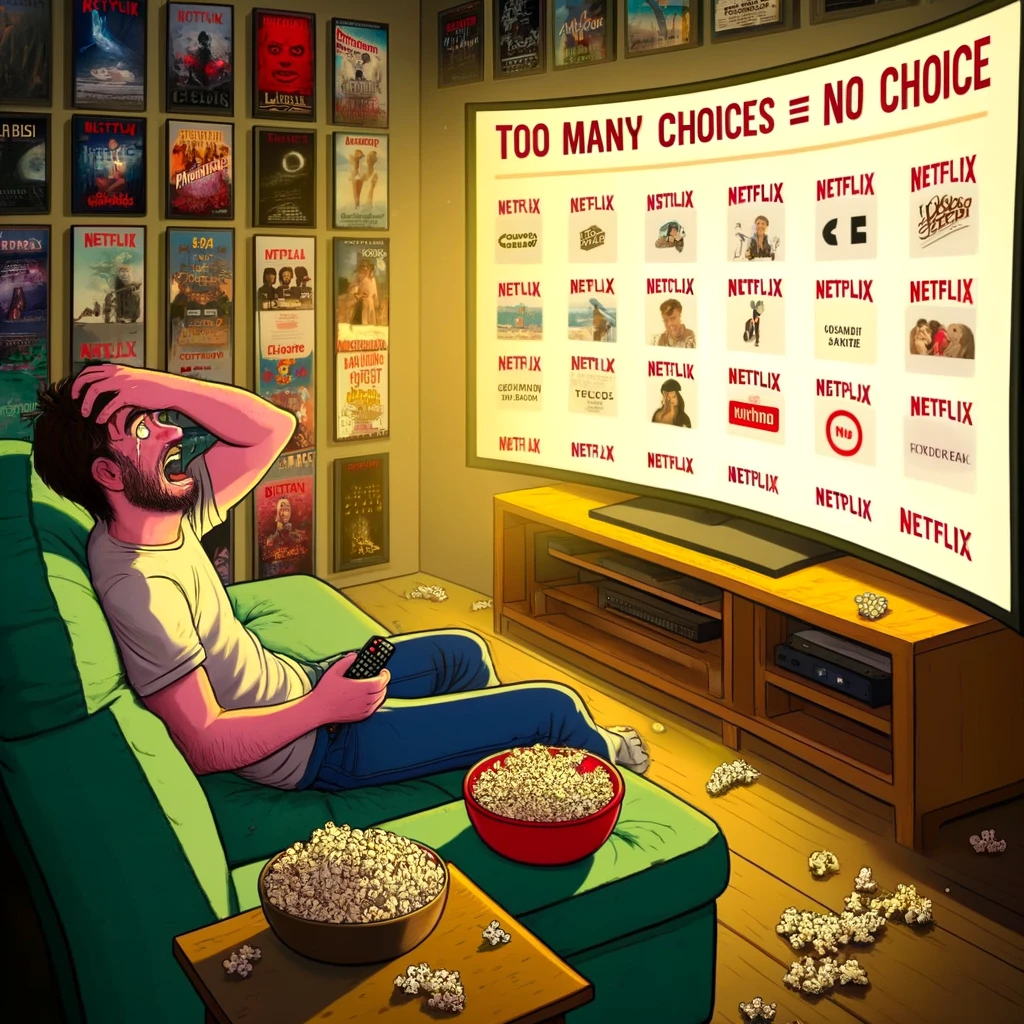This article is originally written in English.

Not choosing sucks. Whether scrolling through Netflix’s catalog or agonizing over career paths that seem equally risky, we’ve all felt the suffocating weight of too many options.
This is the paralysis of choice; having too many options makes it hard to decide, and you end up stuck.
Yet, we can’t stand uncertainty. We’d rather make a bad decision than none because uncertainty leaves us vulnerable to judgment in a world that demands instant opinions. I’ve lost count of the hours I’ve wasted dissecting decisions that ultimately didn’t matter.
Why do we torture ourselves? We’re wired to crave certainty yet drown in a sea of endless options. The solution isn’t to find the “perfect” choice—it’s to eliminate the worst ones first. As Charlie Munger, echoing mathematician Carl Jacobi, advised: “Invert, always invert.” Stop asking what you should do. Start by ruling out what you shouldn’t.
This article is about escaping the paradox of choice by flipping the script—and reclaiming your sanity.
Why Uncertainty Feels Like a Threat
We feel the pressure of choosing; it makes us part of a group. Is Lionel Messi better than Cristiano Ronaldo? Messi is, but that’s not the point.
Choosing beside one of them makes you select 10 other things afterward. Adidas or Nike? Hard Work or Talent? And many more.
From an evolutionary perspective, uncertainty is often equated to danger. Our ancestors needed to predict and control their environment to survive. Uncertainty could mean the presence of predators or the lack of resources, so a preference for certainty helped make safer survival choices.
Today, with social media platforms, it seems worse. With everyone mimicking genius or knowledge, we unconsciously choose many things. Our minds represent the threat. We have a desire for consistency in our beliefs and perceptions. When someone with the same beliefs as us makes a choice on something and shares it with us or online, we have a high probability of making the same choice. With access to so many people instantly on Social Media, it’s just faster.
Uncertainty can create cognitive dissonance, a psychological state where conflicting attitudes, beliefs, or behaviors cause discomfort. People are motivated to reduce this dissonance by seeking certainty.
Procrastination also does not help. When you have a decision to make, taking too much time increases your stress. I’ll decide later” becomes mental baggage.
The Inverse Law: Why Eliminating Bad Choices Beats Hunting for Perfect Ones.
All I want to know is where I’m going to die, so I’ll never go there.
— Charlie Munger.
Charlie Munger, Warren Buffet’s partner at Berkshire Hathaway, has developed a formula for choosing or seeking options. It’s the law of inversion.
For example, instead of asking yourself which career to choose, start by asking yourself which career you do not want.
Once, in a conference, when he talked to the audience and Warren Buffet, Charlie Munger quoted: It is remarkable how much long-term advantage people like us have gotten by trying to be consistently not stupid, instead of very intelligent.”
You got it.
But wait, is that easy to do?
The answer: yes, our cognitive bias.
As humans, we have multiple biases. We’ll focus on Loss aversion and negativity bias.
Humans are wired to prioritize avoiding losses over acquiring gains (Kahneman & Tversky’s Prospect Theory). This makes us hyper-aware of potential downsides. We instinctively scan for threats. Just take a look; the last time you received the news, your first thought ( 75% chance) was negative. News companies know that; that’s why the news is always bad in some sense.
Take advantage of that negativity to help you build.
We’re biologically predisposed to dwell on potential failures—making inversion feel natural.
When choosing a car, you might eliminate models with poor safety ratings before comparing fuel efficiency.
When choosing a partner for life, avoid catastrophic mismatches first, then focus on compatibility. First, define the partner with whom you certainly do not want to live the rest of your life, then seek the one without those traits.
How to Apply Inversion to Everyday Decisions
Step 1: Define Your “Anti Goals”.
For example, instead of “Find a great job,” list “No jobs with toxic cultures or 80-hour weeks.
Step 2: Ruthless Elimination.
Use filters to discard options that fail your “anti-goals.” For example, with dating apps, swipe left on dealbreakers first.
Step 3: Choose Freely from What’s Left.
Choosing a vacation spot by ruling out cold climates and tourist traps first.
Reduces FOMO (fear of missing out) by reframing exclusion as empowerment.
Conclusion: Choosing Less to Live More
The paradox of choice isn’t about options—it’s about fear. Inversion turns fear into agency.
Pick one decision you’re stuck on and invert it. For example, What career would I never want?
For the long-term: Build an “anti-checklist” for major life choices.
Eliminate → Filter → Choose.
Also, I want you to pay attention to decision fatigue. You don’t have to choose everything that drains your decision-making efficiency. Steve Jobs wore the same clothes, so he didn’t have to choose what to wear each morning (I’m terrible at this).
Try to make decisions on things that matter the most.
The best choices aren’t the ones you make—they’re the ones you unapologetically rule out.
Thanks for reading my article. It won’t take me a year to publish again.
Till then, see you.
Reference$
- Quote Munger.. https://filip.modderie.be/portfolio/it-is-remarkable-how-much-long-term-advantage-people-like-us-have-gotten-by-trying-to-be-consistently-not-stupid-instead-of-trying-to-be-very-intelligent/
- Poor Charlie’s Almanac (Book) (2024)
I’ve also written an article on “What would you do if money were no object if you want to check it.
P.S: 5% of this article is from AI.
